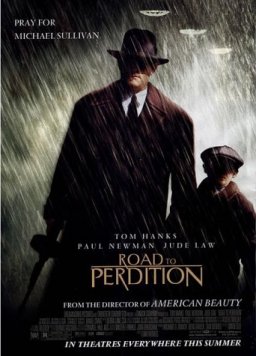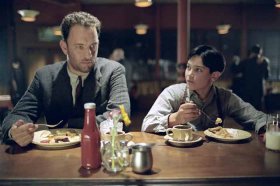|
Road To Perdition
Ideally, fathers want their sons to become something better than themselves. Because John Rooney (Paul Newman) notes to his employee, "…everyone in this room is a killer," it should be easy for Michael Sullivan (Tom Hanks) to make sure that his son Michael, Jr. (Tyler Hoechlin) achieves more than murder. But director Sam Mendes points out in Road To Perdition that violence isn't just seductive; for a certain kind of man, it's all too easy. Whether intended or not, in the movies, it can also be terribly beautiful.
The senior Michael Sullivan has knowingly grown up in the shadow of the mob. Taken under Rooney's wing at a young age, he has become a second son to the boss. Despite being a hit man, Michael has managed to largely shield his wife and two sons from the harsh reality of his job. When his youngest son Peter (Liam Aiken) asks what he does, Michael's wife (Jennifer Jason Leigh) snaps, "he puts food on your plate." And that's enough for Peter.
But Michael, Jr. knows that something is up; he's too smart a child not to suspect that there's more to the genial roguishness that seems to inhabit every one of his father's friends. His curiosity naturally leads to a tragedy that culminates in the deaths of his brother and mother. Rooney's real son, Connor (Daniel Craig), possibly insane, bears no sense of kinship toward the Sullivans, forcing the two Michaels to run.
As the double-edged title suggests, Road To Perdition is about a man's battle for a soul. It is too late for the hitman, but the desperate road trip he takes with his son is a last-ditch effort to completely damn himself while making sure that his son will never meet him in Hell. Along the way the film weaves itself into known mob history, with several appearances by Capone enforcer Frank Nitti (Stanley Tucci), never shying away from the constant menace that such a life would bring.
However, the fictional elements are meant to hold the audience's interest. While Michael Sullivan plays a game of cat and mouse with Rooney, Nitti brings in Maguire (Jude Law), an assassin who double-dips by photographing his kills, then selling the pictures to the newspapers.
Through Maguire we might get an uncomfortable glimpse of ourselves; after all, by buying a ticket to the movie, we, too, are feeding off of its violence. But as beautiful as the movie is, it shies away from making us too uncomfortable.
Part of that is achieved by casting Hanks as an only slightly repentant killer. At times, the dissonance works, particularly early in the movie when it's most crucial. But Mendes also gives in to Hanks' mannerisms and screen habits, shoe-horning in a scene in which the actor gets to lay out all his character's emotional truths to his son. In the first half of the movie, it's completely believable that Hanks has already lost his soul, and it's fascinating to watch. But as he gets closer to exacting his revenge, the movie refuses to risk our hatred, and makes sure that we understand how hard this all is for Sullivan.
Trying to play it both ways keeps Road To Perdition from being a truly great film, but it is extremely watchable. Based on a graphic novel by Max Allan Collins and Richard Piers Rayner, the movie often nods to its roots. Coming from a stage background, Mendes (American Beauty) already tends to frame his shots as if trapped on a stage, but here the effect often looks like scenes are encased in comic book panels. A bank-robbery montage sweeps from left to right, with walls forming the borders of the page.
We also get to see three generations of great actors. Even though he often displays his usual movie star tics, Hanks is still a star for a reason, and is always watchable. Still refusing to fade away (and I, for one, am grateful), Newman turns in a gripping performance as an almost Lear-like mob boss. He hasn't divided his kingdom, but blood has forced him to stand by the one person who will do him the most damage; his tragedy is palpable, but Newman also never lets us forget the corruptness of his soul. Anchoring the movie is relative newcomer Hoechlin; sober-eyed and forced into the tricky job of narrating the movie, the boy manages to come across as real. Because of the seriousness of the film, he's more likely to follow Kieran Culkin than Macauley and develop into a really good adult actor.
Law's character registers more because of the creepiness of its concept than because of a great performance. The handsome actor has already begun suffering from the Brad Pitt syndrome, hating his good looks so much that he will do everything he can to undercut them on film. His hair drastically thinned, and his face later scarred, Law sort of ambles through the movie. Don't worry, Jude, those of us with wives or girlfriends sighing over you already hate your good looks enough for you. No need to taunt us by slumming.
Thankfully and not unexpectedly, the movie also gets a lot of little details right. Particularly cool for comic book fans is that a 1934 Lone Ranger Big Little Book is crucial to the war for Michael Sullivan, Jr.'s soul. Any movie that throws that sort of detail in earns an extra star. Or in Fanboy Planet's case, an extra dollar.
Critics have been falling all over themselves calling this the first major Oscar contender of the year. That may be true, but that's only because there really isn't anything out there right now up to its level. At first glance, it has all the credentials to be one. But in many ways, Mendes has repeated himself after American Beauty. The score by Thomas Newman sounds similar to that of the earlier film (in some places, jarringly so). Thematically, the two films have much in common.
When time provides a little distance, we'll still see a good movie. Just not a great film.
What's It Worth? $7.50
Want to check out the graphic novel? Get Road to Perdition from Amazon.com.















